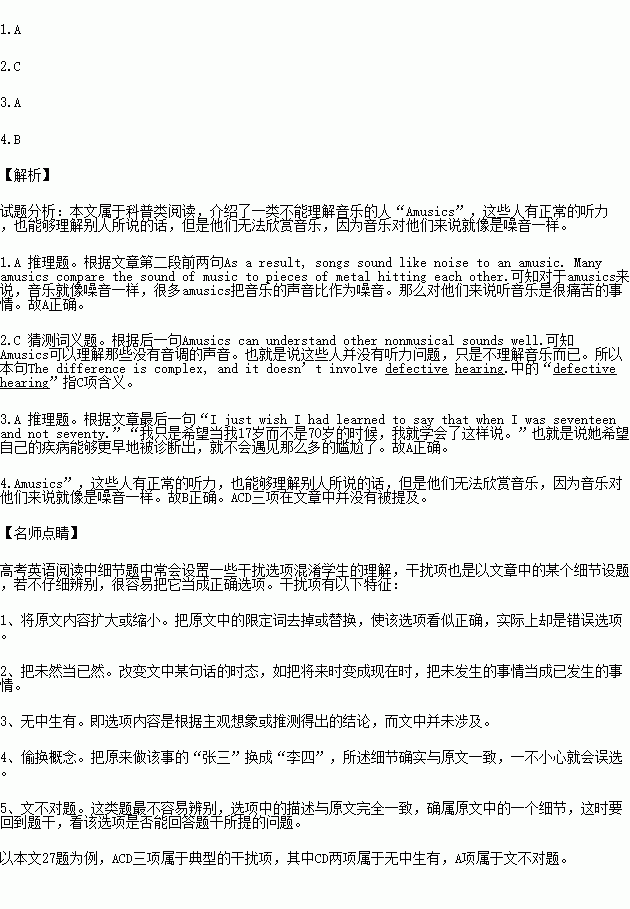题目内容
For some people, music is no fun at all. About four percent of the population is what scientists call “amusic.” People who are amusic are born without the ability to recognize or reproduce musical notes (音调). Amusic people often cannot tell the difference between two songs. Amusics can only hear the difference between two notes if they are very far apart on the musical scale.
As a result, songs sound like noise to an amusic. Many amusics compare the sound of music to pieces of metal hitting each other. Life can be hard for amusics. Their inability to enjoy music set them apart from others. It can be difficult for other people to identify识别 with their condition. In fact, most people cannot begin to grasp what it feels like to be amusic. Just going to a restaurant or a shopping mall can be uncomfortable or even painful. That is why many amusics intentionally stay away from places where there is music. However, this can result in withdrawal and social isolation隔离. “I used to hate parties,” says Margaret, a seventy-year-old woman who only recently discovered that she was amusic. By studying people like Margaret, scientists are finally learning how to identify this unusual condition.
Scientists say that the brains of amusics are different from the brains of people who can appreciate music. The difference is complex, and it doesn’t involve defective hearing. Amusics can understand other nonmusical sounds well. They also have no problems understanding ordinary speech. Scientists compare amusics to people who just can’t see certain colors.
Many amusics are happy when their condition is finally diagnosed (诊断). For years, Margaret felt embarrassed about her problem with music. Now she knows that she is not alone. There is a name for her condition. That makes it easier for her to explain. “When people invite me to a concert, I just say, ‘No thanks, I’m amusic,’” says Margaret. “I just wish I had learned to say that when I was seventeen and not seventy.”
1.Which of the following is true of amusics?
A.Listening to music is far from enjoyable for them.
B.They love places where they are likely to hear music.
C.They can easily tell two different songs apart.
D.Their situation is well understood by musicians.
2.According to paragraph 3, a person with “defective hearing” is probably one who __________.
A.dislikes listening to speeches
B.can hear anything nonmusical
C.has a hearing problem
D.lacks a complex hearing system
3. In the last paragraph, Margaret expressed her wish that __________.
A.her problem with music had been diagnosed earlier
B.she were seventeen years old rather than seventy
C.her problem could be easily explained
D.she were able to meet other amusics
4.What is the passage mainly concerned with?
A.Amusics’ strange behaviours.
B.Some people’s inability to enjoy music.
C.Musical talent and brain structure.
D.Identification and treatment of amusics.
 课堂全解字词句段篇章系列答案
课堂全解字词句段篇章系列答案 步步高口算题卡系列答案
步步高口算题卡系列答案
